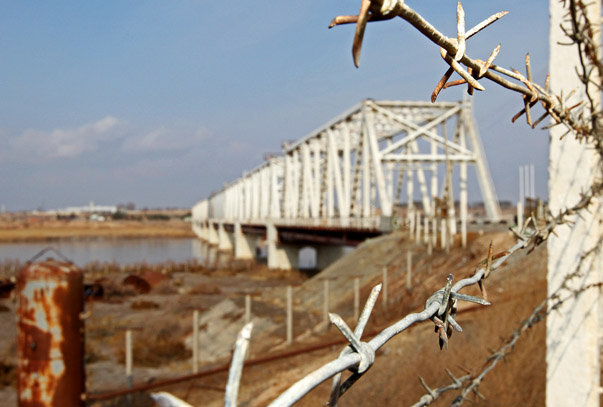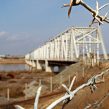
Questions In Tajikistan Over Real Target of “Terrorist” Railway Bridge Bombing In Uzbekistan
Publication: Eurasia Daily Monitor Volume: 8 Issue: 215
By:

A mysterious blast on a vital Uzbekistan rail route on November 17 has been followed by a stranger Uzbek disinterest in repairing the damage or sharing details of the investigation into the incident. The Tashkent government formed a commission to investigate the bombing of the railway bridge when news of the bombing first appeared in the Uzbek press two days after the incident (www.gazeta.uz, November 19).
The blast, described as a “terrorist act,” occurred at a railway bridge on the line connecting the Termez terminal at the Uzbekistan-Afghanistan border and the city of Qurghonteppa in southwestern Tajikistan (Pravda Vostoka [Tashkent], November 19; RIA Novosti, November 19). More precisely, the attack came in the Surkhandarya region between the Galaba and Amu Zang stations along a stretch of line that runs parallel to the Amu Darya River. Afghanistan lies on the southern side of the river. The roughly 250 kilometer rail line is an important commercial outlet for Tajikistan, which has lately had differences with Uzbekistan over the administration of their mutual border.
Termez is the southern terminal of the Northern Distribution Network (NDN), the supply network for US and International Security Assistance Force (ISAF) troops in Afghanistan. Supplies must be offloaded from the rail system at Termez and transferred to trucks for the final lap into Afghanistan. The United States negotiated an agreement to use Termez in 2008, though the German military has quietly leased an air base there since 2002.
Attacks by Islamist militants in Uzbekistan have become rare in recent years, partly as the result of a relentless government campaign against any activity that remotely resembles any form of religious extremism. Security services cast a wide net in their search for militants and there are numerous reports from human rights organizations that detention can mean severe treatment and even death. A closed-door trial is currently underway in Tashkent of 16 Muslims charged with participation in “extremist religious, separatist, fundamentalist or other banned organizations” (www.UzNews.net, November 15). Uzbekistan’s Security Service (SNB) has even gone so far as to issue a November 12 warning to Uzbekistan’s writers, artists, dramatists and filmmakers to avoid the use of any kind of religious theme in their works (www.UzNews.net, November 12).
If the bombing was the work of Islamist militants wanting to disrupt the NDN, their choice to attack the line to southwestern Tajikistan rather than the main line running north from Termez seems odd. The absence of any claim of responsibility if the bomb was indeed the work of Islamist militants is also very unusual. Such groups typically make maximum political value of every attack against the state or its institutions.
Though the blast occurred in Uzbekistan, the greatest harm has been inflicted on Tajikistan’s rail system, which incurred losses in finding alternative transportation for stranded passengers in Uzbekistan and now has hundreds of freight cars loaded with goods in Uzbekistan unable to cross back into southwestern Tajikistan. According to a Tajik rail official, the Uzbeks would normally have the capability of repairing such damage within a day. Instead, a Tajik offer of assistance went unacknowledged and no timetable has been set for repairs (Asia-Plus [Dushanbe], November 18). Shipping goods through another line to Dushanbe and then onward by truck through mountain passes to southern Tajikistan would be prohibitively expensive, so any prolonged interruption to the Termez-Qurghonteppa rail line would have a severe effect on the Tajik economy.
Relations between Uzbekistan and the smaller and more isolated Tajikistan have been strained for at least a decade by a number of issues, most notably Tajikistan’s ongoing construction of the massive Rogun hydroelectric dam project, which Uzbekistan claims would damage that nation’s vital cotton production industry.
The latest blow to Uzbek-Tajik relations came on November 13, when an Uzbek border guard was shot and killed by Tajik border guards who were allegedly helping narcotics smugglers bring 3.84 kilograms of heroin into Uzbekistan (Interfax-AVN, November 17). Tajik authorities initially denied the involvement of Tajik border guards in the incident, which allegedly included personnel from the Tajik Main Border Directorate’s Sughd regional department (Regnum, November 17). A spokesman for the Tajik Border Guards later admitted that a Tajik border guard had killed one of his Uzbek counterparts, but only did so after the Uzbeks had crossed into Tajik territory to protect the smugglers. The spokesman insisted that no drugs were found at the scene (RFE/RL, November 15).
Uzbekistan’s SNB has demanded an unbiased investigation by Tajik authorities regarding the Border Guards’ involvement in drug trafficking while warning of tough measures to counter future attacks. The drugs were apparently concealed inside electric heaters and the SNB invited their Tajik counterparts to examine the remaining heaters to see if drugs were concealed within them. Uzbek officials have, however, conceded that the Tajik border guards may have been deceived into helping smuggle electric heaters rather than narcotics, a scenario based on the claim that the guards received a far smaller payment than is normally associated with assistance in drug smuggling (Interfax-AVN, November 17).
On the same day as the railway bridge bombing, Tashkent issued a strong warning to Tajikistan to avoid a repeat of the November 13 border incident: “Should the Tajik side act like this again, the Uzbek side retains the right to take the toughest and most resolute measures in line with the norms and practice of international relations in order to crack down on aggressive provocations on the border, to ensure the security of citizens and Uzbekistan’s territorial integrity in full” (Interfax, November 17). In Tajikistan, however, there are now suggestions that the railway blast may have more to do with Uzbekistan’s opposition to the Rogun dam project than with terrorism (ImruzNews [Dushanbe], November 21).




